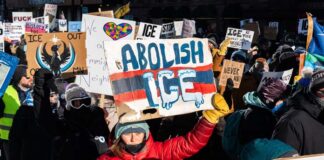Dutch Islamophobe Geert Wilders hoped his Australian tour would further the spread of his racist anti-Muslim politics. But after he was dogged by protests and opposition, he told tour organisers, “I bet you think twice about ever inviting me to Australia again”.
In both Melbourne and Sydney his meetings were confronted by angry demonstrations branding him a racist. In Perth he was forced to cancel his speech after the venue withdrew the booking at the last minute. In both Sydney and Melbourne he was forced far out into the suburbs after a succession of other venues refused to host him. Thirty venues in Sydney alone told Wilders he was not welcome.
Protesters were accused of wanting to deny Wilders free speech. But the kind of racist hate speech Wilders peddles leads directly to a growth in violent racist attacks. He wants to deny other people their freedom, by stopping them practicing their religion, and by subjecting them to attacks on the street.
In the Netherlands, Wilders has succeeded in making openly racist statements about Muslims an accepted part of the political mainstream. His Party for Freedom now holds 15 seats in the Dutch parliament. Although he likes to pretend he is not a racist, he calls for a complete end to any further Muslim or non-Western immigration and demands the closure of all Islamic schools. Wilders indiscriminately labels the entire Muslim community as dangerous and violent.
He has set out to encourage other groups to copy his example across the world, setting up an “International Freedom Alliance” in 2010 to promote his own brand of anti-Muslim racism. He has toured across Europe and the US to assist those who share his views.
Protests worked
From the minute of his arrival in Australia, Wilders was given blanket coverage in the media, using non-stop interviews to promote his racist lies about Muslims. Many on the left argued that protests were counter-productive, and would only draw attention to him. But they had missed the point. The mainstream media can hardly be trusted to ignore such a high profile Islamophobic bigot. They have spent the last ten years helping spread fear about Muslims themselves, with scare stories about “home grown terrorists” and “ethnic” crime.
Without protests, his views would have faced much less challenge. The protests forced the media to report on the opposition to Wilders, and that many saw him as a racist. They also sent a message to the hard core of racists, like tour organisers the Q Society, that racist politics will be met by protests and opposition every step of the way.
It is vitally important that Wilders’ tour does not lead to a revival of the far right in Australian politics. The growth of a political party along the lines of Wilders’ Party for Freedom in Australia would mark a dangerous move to the right.
This threat was last seen in Australia during the rise of Pauline Hanson and her One Nation party. Hanson railed against Asian immigration and the supposed privileges extended to Aboriginal people after her election in 1996, touring the country to try to build an openly racist party. The result was an immediate rise in racist attacks on Asians and migrants, as racists across the country gained confidence. Protests against Hanson’s meetings were crucial to ending her political career.
Mainstream political leaders like John Howard, but also the current Labor government, have happily tapped into the racist vote through the use of “dog-whistle” politics that imply migrants or refugees are to blame for social problems. But openly racist politicians like Geert Wilders take this a step further by openly calling for cuts to immigration or the deportation of Muslims.
But racism remains at the centre of Australian politics, through the appalling competition between Labor and Liberal about how to stop refugee boats. The more mainstream parties beat the racist drum, the more likely it is new threats even further to the right will emerge.
By James Supple





